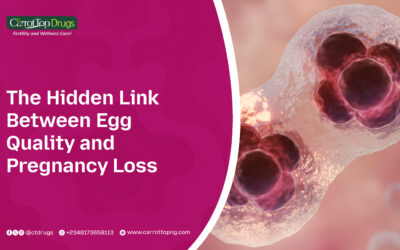Cervical mucus is a gel-like fluid produced by the cervix that helps sperm reach the egg for fertilization. Its quality can determine how easily sperm can swim through it and how long they can survive. In this article, we’ll explore the importance of cervical mucus quality, how to improve it, and its impact on fertility.
What is cervical mucus quality?
Cervical mucus quality refers to the texture, amount, and consistency of the fluid produced by the cervix. The quality of cervical secretions changes throughout the menstrual cycle. This is due to hormonal fluctuations. During ovulation, cervical mucus becomes clear, slippery, and stretchy, resembling raw egg white. This type of mucus is also known as fertile cervical mucus. It facilitates sperm survival and movement, making it easier for them to reach the egg.
Composition of Cervical Mucus
What are the components of cervical mucus? It is made up of various components that work together to facilitate its functions. In this section, we will discuss the composition of cervical mucus in more detail.
The primary component of cervical mucus is water, which makes up about 95% of its volume. The remaining 5% is made up of electrolytes, proteins, and glycoproteins. Electrolytes in cervical mucus include sodium, potassium, and chloride ions. These electrolytes help to maintain its pH balance and regulate its viscosity.
Proteins are another crucial component of cervical mucus. They are responsible for:
- its elasticity,
- adhesive properties,
- and the formation of a protective barrier against harmful bacteria.
The proteins in cervical mucus include mucins. These are long-chain glycoproteins that give it its stringy and stretchy texture. Mucins are synthesized and secreted by the cervical epithelium. Their expression is regulated by estrogen and progesterone hormones.
Glycoproteins are also present in cervical mucus and play an important role in fertility. They act as a natural lubricant. They help to enhance motility and increase the lifespan of sperm within the female reproductive tract. Glycoproteins are also responsible for the unique stickiness of cervical mucus. This facilitates sperm transport through the cervix into the uterus and fallopian tubes.
The composition of cervical mucus changes throughout the menstrual cycle. It is influenced by hormonal fluctuations. During the fertile window, cervical mucus becomes thinner, clearer, and stretchy. It facilitates sperm transport and increases the chances of conception. However, during non-fertile periods, cervical mucus becomes thicker and less abundant. providing a physical barrier to sperm and preventing conception.
Why is cervical mucus quality important?
The quality of cervical mucus can impact a woman’s ability to conceive. Thus, making it a crucial factor to consider when trying to conceive.
When the cervical mucus is of poor quality, it can impede the sperm’s movement. Thus, making it harder for them to reach the egg. This can significantly reduce the chances of fertilization and conception. Furthermore, poor-quality cervical secretions can cause sperm damage. This leads to decreased motility and viability, further reducing the chances of pregnancy.
On the other hand, good cervical secretions quality can enhance fertility. This occurs because it creates a conducive environment for the sperm to thrive. The cervical mucus helps nourish and protect the sperm. This allows them to survive for longer periods, increasing the chances of fertilization. Moreover, it acts as a channel to transport the sperm to the egg. This increases the probability of conception.
In addition to its role in conception, cervical mucus quality is also an essential indicator of a woman’s reproductive health. Abnormal cervical mucus secretions can be a sign of underlying medical conditions. Infections or hormonal imbalances are common conditions. Therefore, monitoring cervical mucus quality can help detect any underlying issues.
Types of Cervical Mucus: Understanding Your Fertility Signs
Cervical mucus changes in texture and consistency throughout the menstrual cycle. This depends on the levels of estrogen and progesterone in the body. Tracking these changes can help improve the chances of conception.
There are four main types of cervical mucus that women may experience:
Dry or Sticky Mucus
This type of cervical mucus is thick and pasty and may feel dry or sticky to the touch. It is typically produced in the days immediately following menstruation. This is due to the low levels of estrogen. It does not provide an ideal environment for sperm survival and mobility. This makes it difficult for fertilization to occur.
Creamy Mucus
Creamy cervical mucus is thicker and more opaque than dry mucus. It may have a lotion-like texture and may be white or yellowish in color. It typically appears in the days leading up to ovulation when estrogen levels are increasing. While it may still be difficult for sperm to swim through, it is more hospitable than dry mucus.
Egg White Mucus
Egg white cervical mucus is thin, stretchy, and translucent, resembling raw egg whites. It is the most fertile type of cervical mucus and indicates that ovulation is approaching. It provides a slippery pathway for sperm to swim through and can help sperm survive for several days.
Watery Mucus
Watery cervical mucus is thin and clear, similar in consistency to water. It typically appears just before or after egg white mucus and indicates that ovulation is near. It provides a good environment for sperm survival and mobility.
How to Identify Types of Cervical Mucus?
Identifying the type of cervical mucus you are experiencing can be done by observing the:
- color,
- texture,
- and consistency of the mucus.
To do this, wash your hands thoroughly. Insert a finger into your vagina to collect a sample of mucus from the cervix.
Dry or sticky mucus will feel thick and pasty and may be difficult to collect. Creamy mucus will be thicker than egg-white mucus and may be opaque. Egg white mucus will be thin, stretchy, and translucent, resembling raw egg whites. Watery mucus will be thin and clear, similar in consistency to water.
What Cervical Mucus Indicates About Your Fertility
Tracking changes in cervical mucus can help women identify their fertile days. Targeting these days can improve a woman’s chances of conception.
Dry or sticky mucus indicates that ovulation is not imminent. This means that the chances of conception are low. Creamy mucus indicates that ovulation is approaching. It means that the chances of conception are higher than during dry mucus.
Egg-white mucus indicates that ovulation is imminent. At this point, the chances of conception are at their highest. Watery mucus is also a sign that ovulation is near, and the chances of conception are high.
Factors Affecting Cervical Mucus Quality
There are various factors that can affect the quality of cervical mucus. In this section, we will discuss them in detail.
Lifestyle Choices and Cervical Mucus Quality
There are a number of lifestyle choices that can impact the quality of cervical mucus. These include:
1. Diet
The food we eat can have a significant impact on our overall health, including our reproductive health. A diet high in processed foods and saturated fats can lead to inflammation in the body, which can negatively impact cervical mucus quality. On the other hand, a diet rich in fruits, vegetables, and whole grains can help to support healthy cervical mucus production.
2. Exercise
Regular exercise is important for maintaining overall health. It can also have a positive impact on cervical mucus quality. Exercise helps to improve circulation, which can increase blood flow to the reproductive organs and support healthy cervical mucus production.
3. Smoking
Smoking has been linked to a number of reproductive health issues, including decreased cervical mucus production. It can also lead to inflammation in the body, which can further impact cervical mucus quality.
4. Alcohol and caffeine consumption
Both alcohol and caffeine can have a dehydrating effect on the body, which can lead to decreased cervical mucus production. It is important to consume these substances in moderation and stay well hydrated to support healthy cervical mucus production.
Hormonal Imbalance
Hormonal imbalances can have a significant impact on the production and quality of cervical mucus. The hormones estrogen and progesterone play a crucial role in cervical mucus production. Changes in their levels can affect cervical secretions quality.
During the menstrual cycle, estrogen levels increase. This leads to an increase in cervical mucus production and changes in its consistency. As ovulation approaches, cervical mucus becomes thinner and more stretchy, resembling the consistency of raw egg whites. This type of cervical mucus is considered the most fertile and allows sperm to swim easily through the cervix and into the uterus.
After ovulation, progesterone levels increase and cause cervical mucus to become thicker and less stretchy. Sperms find it difficult to penetrate the cervix during this period. However, if conception occurs, progesterone levels remain elevated to support pregnancy and cervical mucus production continues throughout pregnancy to protect the fetus from infection.
Hormonal imbalances such as those seen in polycystic ovary syndrome (PCOS) or thyroid disorders can disrupt the delicate hormonal balance. It affects estrogen and progesterone and affects cervical mucus quality. In PCOS, high levels of androgens (male hormones) can disrupt the normal hormonal balance and lead to a decrease in estrogen levels, which can result in a decrease in cervical mucus production and quality. Thyroid disorders can also affect cervical mucus secretions as the thyroid hormones play a role in regulating the menstrual cycle and hormonal balance.
Medications
Certain medications can have an impact on cervical mucus quality. Some of which include hormonal contraceptives, antihistamines, and antidepressants. These medications can affect cervical mucus production and consistency by altering hormone levels.
Hormonal contraceptives, such as birth control pills, patches, and rings, work by suppressing ovulation and altering hormone levels. This can result in a decrease in cervical mucus production and quality. Women who use hormonal contraceptives may notice changes in the amount and consistency of their cervical mucus. It may become thicker and less stretchy, making it more difficult for sperm to penetrate.
Antihistamines, which are commonly used to treat allergies, can also affect cervical mucus quality. These medications can cause the cervical mucus to become thicker and more difficult for sperm to penetrate. It is important to note that antihistamines may also cause vaginal dryness, which can further decrease fertility.
Similarly, antidepressants can also impact cervical mucus quality. Some types of antidepressants, such as selective serotonin reuptake inhibitors (SSRIs), can cause vaginal dryness and reduce cervical mucus production. This can make it more difficult for sperm to reach the egg and reduce the chances of conception.
Hydration Level
Hydration level is another factor that can impact cervical mucus quality. When the body is dehydrated, it can lead to thick and sticky cervical mucus. This makes it more difficult for sperm to travel through the cervix and fertilize the egg.
It is important to stay hydrated in order to maintain healthy cervical mucus production. Drinking enough water throughout the day can help ensure that cervical mucus stays thin and watery. In addition, staying hydrated can help improve overall reproductive health. It also increases the chances of conception.
Infections
Infections can be another factor that can negatively impact cervical mucus quality. It can cause inflammation and irritation in the reproductive tract. These lead to changes in the cervical mucus.
Sexually transmitted infections (STIs) such as chlamydia, gonorrhea, and trichomoniasis can affect cervical mucus quality. These infections can cause inflammation in the cervix. This can lead to an increase in cervical mucus production. However, the quality of this mucus may be compromised due to the presence of bacteria or other pathogens. This makes it less hospitable to sperm.
Yeast infections can also affect cervical mucus quality. Yeast infections can cause changes in the pH balance of the vagina. This change in pH can affect the quality of cervical secretions. The cervical mucus may become thick and clumpy.
Stress
Stress is a common factor that can affect hormone levels and cervical mucus production, ultimately impacting cervical mucus quality. During stress, the body releases cortisol. This is a hormone that can interfere with the production of reproductive hormones such as estrogen and progesterone. These hormones play a crucial role in the production and quality of cervical mucus.
Studies have shown that stress can lead to changes in cervical mucus production and quality. High levels of stress can cause the cervical mucus to become thick and sticky. This thick mucus makes it difficult for sperm to travel through the reproductive tract. This can ultimately reduce the chances of conception.
Age
Age is another factor that can significantly affect cervical mucus quality. As women age, their cervical secretions production decreases, and the quality of the cervical secretions may also decrease. This can make it difficult for sperm to move through the cervix and reach the egg.
As women approach menopause, their cervical mucus production decreases. The quality of the cervical mucus also reduces. The cervical mucus becomes thicker and less stretchy. This type of mucus makes it more difficult for sperm to move through the cervix. The pH level of the cervical mucus also changes, becoming less acidic and less hospitable to sperm.
It is essential for women to understand how age affects cervical mucus quality and how this can impact fertility. Women who are planning to conceive should monitor their cervical secretions to ensure that it is of good quality and present during ovulation.
Nutrition
Nutrition is an essential factor that affects cervical mucus quality. Adequate nutrition is necessary for the body to produce healthy cervical mucus. The nutrients that are essential for cervical mucus production include proteins, vitamins, and minerals.
Proteins play a significant role in cervical mucus production as they help in the formation of mucus strands. A deficiency in protein can lead to reduced cervical secretions production and affect its quality. Vitamins A, C, and E are essential for cervical mucus production. They help in maintaining mucus consistency and protect it from oxidative stress. A deficiency in these vitamins can lead to changes in cervical secretions quality, making it less fertile.
Minerals such as zinc and selenium also play an essential role in cervical mucus production. Zinc is required for the production of hormones that stimulate cervical mucus production. A deficiency in zinc can lead to reduced cervical mucus production. Selenium is required for maintaining the viscosity and elasticity of cervical mucus. A deficiency in selenium can lead to changes in cervical secretions quality, making it less fertile.
A balanced diet that includes a variety of fruits, vegetables, whole grains, lean proteins, and healthy fats can provide the necessary nutrients for cervical mucus production. It is recommended to avoid processed and sugary foods. This is because they can lead to inflammation and affect cervical secretions quality negatively.
Environmental Factors
Environmental factors can have an impact on cervical mucus quality. One such factor is temperature. Exposure to high temperatures can cause dehydration, which can lead to thicker and stickier cervical mucus. On the other hand, exposure to cold temperatures can cause the cervical mucus to become thicker as well, as the body tries to protect itself from the cold. This can affect the movement of sperm and make it difficult for them to reach the egg.
Another environmental factor that can affect cervical mucus quality is exposure to toxins and pollutants. Exposure to toxins such as pesticides and chemicals can disrupt hormonal balance and affect the production and quality of cervical mucus. Pollution in the air can also have a negative impact on cervical secretions quality, as it can lead to inflammation and other health problems that can interfere with cervical mucus production.
It is important to note that these environmental factors can vary depending on the individual and their specific environment. For example, women who work in factories or in areas with high pollution levels may be more likely to experience negative effects on their cervical mucus quality than those who work in less polluted areas.
Sexual Activities
Sexual activity can also have an impact on cervical mucus quality. When sexual activity occurs, the cervix produces more mucus as a way to facilitate the passage of sperm through the cervix and into the uterus. This mucus is thinner and more stretchy than the cervical mucus produced during the non-fertile phase of the menstrual cycle. It allows sperm to move more easily through the cervix.
However, certain sexual behaviors can also affect it. For example, using certain lubricants during sex can affect the pH balance of the vagina. This leads to changes in cervical mucus quality. Similarly, exposure to certain sexually transmitted infections can also have a negative impact on the quality of cervical secretions. Practices, such as those involving multiple partners or unprotected sex, can increase the risk of infection, which can, in turn, affect the quality of a woman’s cervical secretions. Therefore, it is important to practice safe sex and take precautions to minimize the risk of infection if you are trying to conceive and want to optimize cervical mucus quality.
Conclusion
Cervical mucus quality is an essential factor in fertility. Its optimal quality can increase the chances of successful conception. Various factors, such as hormonal imbalances, hydration, medications, infections, and age, can affect cervical secretion quality. However, making certain lifestyle changes can help improve cervical mucus quality and promote overall fertility.
FAQs
Is it normal to have different types of cervical mucus throughout the menstrual cycle?
Yes, it is normal for cervical mucus to change in texture and consistency throughout the menstrual cycle.
Can stress or illness affect cervical mucus?
Yes, stress and illness can affect cervical mucus production and consistency.
Does cervical mucus quality affect my chances of conception?
Yes, cervical mucus quality plays a vital role in fertility, and optimal quality can increase the chances of successful conception.
Can hormonal imbalances affect cervical mucus quality?
Yes, hormonal imbalances, such as low estrogen levels, can result in poor cervical mucus quality.
Can infections affect cervical mucus quality?
Yes, infections, such as bacterial vaginosis or yeast infections, can alter cervical mucus quality, making it thicker and more difficult for sperm to swim through.
What supplements can I take to improve cervical mucus quality?
Supplements such as evening primrose oil, vitamin C, and vitamin E can help improve cervical mucus quality.
Can age affect cervical mucus quality?
Yes, as women age, the quality and quantity of cervical mucus can decline, making it more difficult for sperm to reach the egg.

















